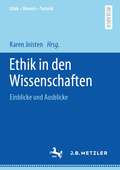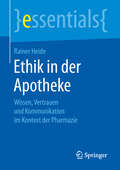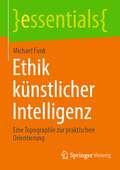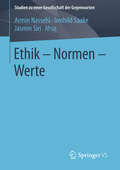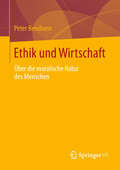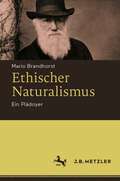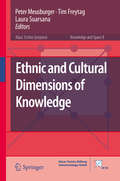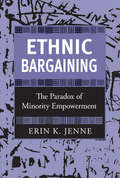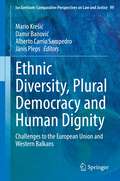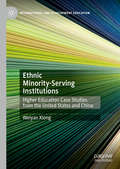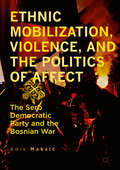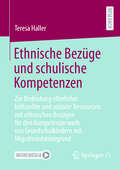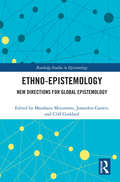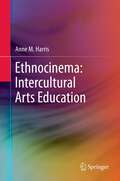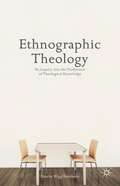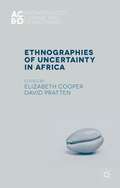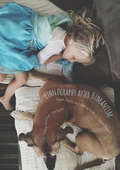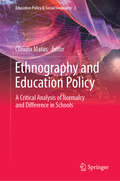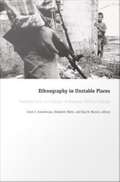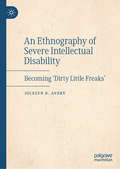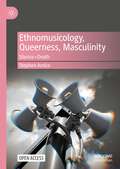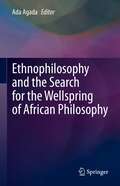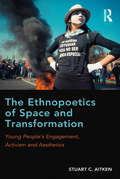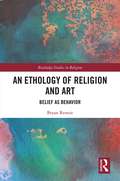- Table View
- List View
Ethik in den Wissenschaften: Einblicke und Ausblicke (Ethik – Mensch - Technik)
by Karen JoistenDas vorliegende Buch gewährt Einblicke und Ausblicke in unterschiedliche Disziplinen der Wissenschaft und die mit ihnen einhergehenden ethischen Probleme und Fragestellungen. Das Buch richtet sich neben dem akademischen Fachpublikum vor allem auch an ein breiteres Publikum, da Ethik nur nachhaltig sein kann, wenn auch die breite Bevölkerung sich kompetent und engagiert ethischen Problemen und Fragen stellt und in den Diskurs einbringt.Die Themen, die in diesem Band diskutiert werden, beziehen sich auf: Ethos und Pathos der Architektur, ethische Aspekte des Regierens, die Digitale Transformation, eine philosophische Unterscheidung von Roboter und Mensch, Grenzen der Medizin, ethische Kriterien der Technikfolgenabschätzung, ethische Entscheidungen im Nachhaltigkeitsmanagement und eine juristische Sicht auf Nachhaltigkeit und Umweltgerechtigkeit.
Ethik in der Apotheke: Wissen, Vertrauen und Kommunikation im Kontext der Pharmazie (essentials)
by Rainer HeideDieses Buch ist ein Plädoyer dafür, dass Pharmazeuten sich mit der moralischen Bewertung ihres Handelns beschäftigen sollten. Der Pharmazeut wird als Kaufmann, selbst bei ethisch und moralisch gutem Handeln, immer anders agieren (müssen) als der Heilberufler, da bei Letzterem allein die selbstlose fachliche Hilfe als Primat des Handelns angenommen wird. Rainer Heide gibt in diesem essential Denkanstöße und Handlungsempfehlungen im interpersonellen Kontext der öffentlichen und Klinikapotheke. Der Autor: Dipl. Biol. Rainer Heide, Pharmazeut, Schwerpunkte seiner Arbeit sind geriatrische Pharmazie und Ethik in der Pharmazie. Rainer Heide lehrt als Honorardozent in der pflegerischen Ausbildung am Klinikum der Universität Jena und an verschiedenen Weiterbildungseinrichtungen. Er ist Mitglied in der Deutschen Gesellschaft für Geriatrie, dem Arbeitskreis „Reduktion freiheitsentziehender Maßnahmen in der Pflege“ der Stadt Jena und Vorstand des Jenaer Demenz Informations- und Beratungsverein JeDI e.V.
Ethik künstlicher Intelligenz: Eine Topographie zur praktischen Orientierung (essentials)
by Michael FunkKünstliche Intelligenz ist zum vielschichtigen Gegenstand ethischer Debatten geworden. Ob Richtlinien fairer Digitalisierung und vertrauenswürdiger Algorithmen, Gestaltung nachhaltiger Geschäftsmodelle, informatische Grundbildung in Schulen oder Existenzfragen freiheitlich-demokratischer Gesellschaften – KI-Ethik steht vor komplexen Herausforderungen. Grundsätzlicher Klärungsbedarf entsteht durch die verschiedenen Zugänge, Interessen und Begrifflichkeiten, die aufeinandertreffen. Vorliegendes essential präsentiert auf zugängliche Weise wissenschaftliches Überblickswissen zur KI-Ethik. Als praktische Orientierungshilfe im komplexen Terrain dient eine thematische Topographie, einschließlich zentraler Begriffe. Zusammenhänge zwischen Industrie 5.0, Regulierung, Post- und Transhumanismus, selbstfahrenden Autos, moralischen Maschinen, nachhaltiger Digitalisierung oder dem Anthropozän werden mit Blick auf KI-Ethik systematisch sichtbar gemacht.
Ethik - Normen - Werte
by Armin Nassehi Irmhild Saake Jasmin SiriWährend philosophische Theorien üblicherweise die Inkonsistenzen eines modernen Werte-Pluralismus mit neuen ethischen Konzepten heilen wollen, interessiert sich die soziologische Systemtheorie für die schlichte Beobachtung moralischer und ethischer Kommunikation. In den Blick rücken dabei praktische Situationen, in denen ethische Konzepte, moralische Subjekte, normative Ansprüche und Werte entstehen und anschlussfähig werden. Dieser Band versammelt empirische Studien zu so unterschiedlichen Kontexten wie Krankenhäusern, Wirtschaftsorganisationen, politischen Debatten und Mode und vermittelt so einen Eindruck von den unterschiedlichen Gegenwarten einer sich moralisch beschreibenden Gesellschaft.
Ethik und Wirtschaft
by Peter BendixenEthik ist ein sehr altes Thema. Doch die Verbindung mit der Wirtschaft ist noch frisch und unausgereift. Es gibt reale Gründe für die Aktualität dieser Fragestellung, und zugleich gibt es Zweifel, ob wir - namentlich die Ökonomen - die richtigen Ansätze zur Wirtschaftsethik gefunden haben. Zu viele Experten haben sich in ihrem eigenen Fachdenken eingeigelt und weisen Gedanken, die neue Wege auftun wollen, ihre stachelige Seite. Meine Grundthese in dieser Schrift lautet: Die Ethik des praktischen Wirtschaftens muss nicht erst erfunden werden, sondern kann als Lehre von der moralischen Kraft aus den elementaren Komponenten des praktischen Wirtschaftens herausdestilliert und zur Sprache gebracht werden.
Ethischer Naturalismus: Ein Plädoyer
by Mario BrandhorstDas Buch entwickelt und verteidigt eine Form des ethischen Naturalismus. Es kreist um zwei Fragen, die durch einen Leitgedanken eng verbunden sind. Dieser Leitgedanke lautet, dass das Leben, das wir führen, mit allen seinen ethischen Aspekten als Teil der Natur anzusehen ist. Die erste Frage lautet, wie dieser Leitgedanke näher zu verstehen ist. Die zweite Frage lautet, was aus diesem Leitgedanken, so verstanden, folgt. Wie könnte das ethische Leben im Verlauf der Evolution des Menschen entstanden sein? Welche Folgen hätte das für uns? Die Untersuchung setzt bei Darwins Grundeinsichten an, die sie durch die weitere Entwicklung der Theorie der Evolution durch natürliche Selektion und moderne Hypothesen zur Erklärung der Entstehung des ethischen Lebens bis zum aktuellen Stand der Diskussion verfolgt. Wie sich zeigt, ist eine naturalistische Deutung nicht nur mit ethischem Denken und Handeln vereinbar, sondern trägt auch dazu bei, dessen Strukturen zu erklären. Relativiert werden dagegen die Ansprüche vieler Moraltheorien, die von überzogenen Erwartungen im Hinblick auf die Objektivität oder die Formalisierbarkeit des Ethischen geleitet sind. Den Abschluss bildet eine Fallstudie zur Menschenwürde, die nach der Deutung dieses Buchs zwar naturalistisch umgedeutet werden muss, aber als eine zentrale ethische Idee erhalten bleiben kann.
Ethnic and Cultural Dimensions of Knowledge
by Peter Meusburger Tim Freytag Laura SuarsanaThis book presents theoretical and methodical discussions on local knowledge and indigenous knowledge. It examines educational attainment of ethnic minorities, race and politics in educational systems, and the problem of losing indigenous knowledge. It comprises a broad range of case studies about specifics of local knowledge from several regions of the world, reflecting the interdependence of norms, tradition, ethnic and cultural identities, and knowledge. The contributors explore gaps between knowledge and agency, address questions of the social distribution of knowledge, consider its relation to communal activities, and inquire into the relation and intersection of knowledge assemblages at local, national, and global scales. The book highlights the relevance of local and indigenous knowledge and discusses implications for educational and developmental politics. It provides ideas and a cross-disciplinary scientific background for scholars, students, and professionals including NGO activists, and policy-makers.
Ethnic Bargaining: The Paradox of Minority Empowerment
by Erin K. JenneIn Ethnic Bargaining, Erin K. Jenne introduces a theory of minority politics that blends comparative analysis and field research in the postcommunist countries of East Central Europe with insights from rational choice. Jenne finds that claims by ethnic minorities have become more frequent since 1945 even though nation-states have been on the whole more responsive to groups than in earlier periods. Minorities that perceive an increase in their bargaining power will tend to radicalize their demands, she argues, from affirmative action to regional autonomy to secession, in an effort to attract ever greater concessions from the central government.The language of self-determination and minority rights originally adopted by the Great Powers to redraw boundaries after World War I was later used to facilitate the process of decolonization. Jenne believes that in the 1960s various ethnic minorities began to use the same discourse to pressure national governments into transfer payments and power-sharing arrangements. Violence against minorities was actually in some cases fueled by this politicization of ethnic difference.Jenne uses a rationalist theory of bargaining to examine the dynamics of ethnic cleavage in the cases of the Sudeten Germans in interwar Czechoslovakia; Slovaks and Moravians in postcommunist Czechoslovakia; the Hungarians in Romania, Slovakia, and Vojvodina; and the Albanians in Kosovo. Throughout Ethnic Bargaining, she challenges the conventional wisdom that partisan intervention is an effective mechanism for protecting minorities and preventing or resolving internal conflict.
Ethnic Diversity, Plural Democracy and Human Dignity: Challenges to the European Union and Western Balkans (Ius Gentium: Comparative Perspectives on Law and Justice #99)
by Mario Krešić Damir Banović Alberto Carrio Sampedro Jānis Pleps“Given their ethnic diversity, to what extent, and at what cost and benefit to human dignity, can European countries adopt and adapt plural democracy?” The contributors to this volume offer answers to this question from a variety of multidisciplinary perspectives within the framework of the integral theory of law and the state. Their shared aim is to explain legal phenomena in the context of other relevant issues and to identify, analyse and critique conceptualizations, problems and situations. This volume is rooted in the historical and contemporary European experience with special cases from Bosnia and Hercegovina, Croatia, Latvia, Slovenia, Spain and Canada which are relevant for understanding the European problem. Solutions to the problem are sought through innovative interpretations of the rule of law, democracy and human dignity, which are followed by argumentation about how these concepts, when recognized as European legal principles, can be implemented in order to avoid ethnic conflicts.Following an introduction that defines the problem at the centre of the book and explains how legal theory can be used to address it, the book consists of eleven contributions divided into three thematic sections. The first covers topics concerning the European principles which can help avoid ethnic conflicts: the principle of compulsory adjudication in interstate relations, the principle of democracy, and principles regarding the recognition of individual and collective identities. These European principles are then investigated by drawing on legal and political theories. The second section presents three ways of conceptualizing ethnical needs in multi-ethnic states: asymmetric federalism, dêmoicratic account and cooperative federalism. The third and final section elaborates on issues concerning the protection of minority rights: the role of judicial ideology in protecting minority rights, citizenship, the EU mechanism for the protection of minority rights, and the importance of remembering tragic events affecting minorities.
Ethnic Minority-Serving Institutions: Higher Education Case Studies from the United States and China (International and Development Education)
by Weiyan XiongThis book presents a comparative study of the history and development of indigenous and ethnic higher education in the US and China. The author focuses on institutions serving American Indians and Alaska Natives (AIANs) and Chinese Ethnic Minorities (CEMs), such as Tribal Colleges and Universities (TCUs) in the US and Ethnic Minority Serving Institutions (EMSIs) in China. Chapters center voices within indigenous and ethnic education, including experts, senior administrators, and faculty members as well as AIAN tribal leaders and activists. These voices enrich the study and provide context to explore the issues and challenges surrounding ethnic and minority-serving higher education institutions today. Finally, the author addresses strategies and practices for the future which will better serve AIAN and CEM students and communities.
Ethnic Mobilization, Violence, and the Politics of Affect: The Serb Democratic Party and the Bosnian War
by Adis MaksićThis book offers an unprecedented account of the Serb Democratic Party’s origins and its political machinations that culminated in Europe’s bloodiest conflict since World War II. Within the first two years of its existence, the nationalist movement led by the infamous genocide convict Radovan Karadzic, radically transformed Bosnian society. It politically homogenized Serbs of Bosnia-Herzegovina, mobilized them for the Bosnian War, and violently carved out a new geopolitical unit, known today as Republika Srpska. Through innovative and in-depth analysis of the Party’s discourse that makes use of the recent literature on affective cognition, the book argues that the movement’s production of existential fears, nationalist pride, and animosities towards non-Serbs were crucial for creating Serbs as a palpable group primed for violence. By exposing this nationalist agency, the book challenges a commonplace image of ethnic conflicts as clashes of long-standing ethnic nations.
Ethnic Politics and State Power in Africa
by Philip RoesslerWhy are some African countries trapped in vicious cycles of ethnic exclusion and civil war, while others experience relative peace? In this groundbreaking book, Philip Roessler addresses this question. Roessler models Africa's weak, ethnically-divided states as confronting rulers with a coup-civil war trap - sharing power with ethnic rivals is necessary to underwrite societal peace and prevent civil war, but increases rivals' capabilities to seize sovereign power in a coup d'#65533;tat. How rulers respond to this strategic trade-off is shown to be a function of their country's ethnic geography and the distribution of threat capabilities it produces. Moving between in-depth case studies of Sudan and the Democratic Republic of the Congo based on years of field work and statistical analyses of powersharing, coups and civil war across sub-Saharan Africa, the book serves as an exemplar of the benefits of mixed methods research for theory-building and testing in comparative politics.
Ethnische Bezüge und schulische Kompetenzen: Zur Bedeutung elterlicher kultureller und sozialer Ressourcen mit ethnischen Bezügen für den Kompetenzerwerb von Grundschulkindern mit Migrationshintergrund
by Teresa HallerDer Band beschäftigt sich mit der Bedeutung migrationsbezogener elterlicher Ressourcen für den Kompetenzerwerb von Grundschulkindern mit Migrationshintergrund in Deutschland. Es werden insbesondere Zusammenhänge zwischen der Ausstattung elterlichen kulturellen und sozialen Kapitals und dem Ausmaß, in dem diese Kapitalarten ethnische Bezüge zum Herkunftsland der Eltern aufweisen mit zwei zentralen kindlichen Kompetenzbereichen (Wortschatz und Mathematik) untersucht. Damit widmet sich die Arbeit einem Thema, das sowohl für die soziologische Ungleichheitsforschung als auch für die empirische Bildungsforschung Relevanz besitzt. Empirisch werden mit Daten der Startkohorte 2 des Nationalen Bildungspanels (NEPS-SC2) und der ESKOM-Studie zwei sich gut ergänzende Datensätze herangezogen und vergleichend analysiert. Hierdurch können einerseits unterschiedliche Herkunftsgruppen in den Blick genommen werden. Andererseits ermöglicht der Ergebnisvergleich robustere Schlussfolgerungen in einem Forschungsfeld mit heterogenen Befunden zur Bedeutung ethnischer Bezüge.
Ethno-Epistemology: New Directions for Global Epistemology (Routledge Studies in Epistemology)
by Masaharu Mizumoto Jonardon Ganeri Cliff GoddardThis volume features new perspectives on the implications of cross-linguistic and cultural diversity for epistemology. It brings together philosophers, linguists, and scholars working on knowledge traditions to advance work in epistemology that moves beyond the Anglophone sphere. The first group of chapters provide evidence of cross-linguistic or cultural diversity relevant to epistemology and discuss its possible implications. These essays defend epistemic pluralism based on Sanskrit data as a commitment to pluralism about epistemic stances, analyze the use of two Japanese knowledge verbs in relation to knowledge how, explore the Confucian notion of justification, and surveys cultural differences about the testimonial knowledge. The second group of chapters defends "core monism"—which claims that despite the cross-linguistic diversity of knowledge verbs, there is certain core epistemological meaning shared by all languages—from both a Natural Semantic Metalanguage (NSM) and skeptical perspective. The third cluster of essays considers the implications of cultural diversity for epistemology based on anthropological studies. These chapters explore real disparities in folk epistemology across cultures. Finally, the last two chapters discuss methods or perspectives to unify epistemology despite and based on the diversity of folk intuitions and epistemological concepts. Ethno-Epistemology is an essential resource for philosophers working in epistemology and comparative philosophy, as well as linguists and cultural anthropologists interested in the cultural-linguistic diversity of knowledge traditions.
Ethnocinema: Intercultural Arts Education
by Anne M. HarrisThe first book entirely devoted to the practice and ethics of the emerging methodology of ethnocinema, this volume brings vividly to life not only the Sudanese young women with whom the author has collaborated for two years, but her own struggles as researcher, teacher and intercultural fellow traveller. A superb resource for anyone interested in conducting their own ethnocinema research project, the contents will be welcomed too by classroom teachers who recognise a need for alternative pedagogies within diverse classrooms, and peripatetic researchers and students who search for authentic representations of their own experiences within the academy and education system. With access to online filmed material included, this publication is part handbook and part theoretical treatise framing a new creative ethnographic methodology. One of a rare breed of books covering the visual research techniques that are gaining traction in the academic community, it also introduces ground-breaking intercultural research into Sudanese women who have resettled in the West. Functional as pedagogic material in university and high school classrooms, this package has broad appeal in the academic and educational sectors. "It is innovative, gutsy, practical, useful, critical and follows principles of socially just research." Prof Carolyn Ellis, University of Southern Florida, USA "This is an ambitious and passionate work. The author has taken on the task not only of exploring the difficult experiences of a group of young refugee women but has also reflected bravely on her own personal and professional life."Assoc Prof Greg Noble, University of Western Sydney, Australia "This is an ambitious and passionate work. The author has taken on the task not only of exploring the difficult experiences of a group of young refugee women but has also reflected bravely on her own personal and professional life." Assoc Prof Greg Noble, University of Western Sydney, Australia "This is an ambitious and passionate work. The author has taken on the task not only of exploring the difficult experiences of a group of young refugee women but has also reflected bravely on her own personal and professional life." Assoc Prof Greg Noble, University of Western Sydney, Australia "It is innovative, gutsy, practical, useful, critical and follows principles of socially just research." Prof Carolyn Ellis, University of Southern Florida, USA "This is an ambitious and passionate work. The author has taken on the task not only of exploring the difficult experiences of a group of young refugee women but has also reflected bravely on her own personal and professional life." Assoc Prof Greg Noble, University of Western Sydney, Australia "This is an ambitious and passionate work. The author has taken on the task not only of exploring the difficult experiences of a group of young refugee women but has also reflected bravely on her own personal and professional life." Assoc Prof Greg Noble, University of Western Sydney, Australia "This is an ambitious and passionate work. The author has taken on the task not only of exploring the difficult experiences of a group of young refugee women but has also reflected bravely on her own personal and professional life." Assoc Prof Greg Noble, University of Western Sydney, Australia
Ethnographic Theology: An Inquiry into the Production of Theological Knowledge
by Natalie Wigg-StevensonThis book uses ethnography as theological practice, yielding a theology constructed at the intersection of church, academy and everyday life. Drawing on the author's research in her Baptist church, the resulting 'ethnographic theology' produces creative theological insights, while also proposing fresh alternatives for Christian thought and action.
Ethnographies of Uncertainty in Africa
by Elizabeth Cooper David PrattenThis collection explores the productive potential of uncertainty for people living in Africa as well as for scholars of Africa. Eight ethnographic case studies from across the continent examine how uncertainty is used to negotiate insecurity, create and conduct relationships, and act as a source for imagining the future.
Ethnography after Humanism
by Lindsay Hamilton Nik TaylorThis book argues that qualitative methods, ethnography included, have tended to focus on the human at the cost of understanding humans and animals in relation, and that ethnography should evolve to account for the relationships between humans and other species. Intellectual recognition of this has arrived within the field of human-animal studies and in the philosophical development of posthumanism but there are few practical guidelines for research. Taking this problem as a starting point, the authors draw on a wide array of examples from visual methods, ethnodrama, poetry and movement studies to consider the political, philosophical and practical consequences of posthuman methods. They outline the possibilities for creative new forms of ethnography that eschew simplistic binaries between humans and animals. Ethnography after Humanism suggests how researchers could conduct different forms of fieldwork and writing to include animals more fruitfully and will be of interest to students and scholars across a range of disciplines, including human-animal studies, sociology, criminology, animal geography, anthropology, social theory and natural resources.
Ethnography and Education Policy: A Critical Analysis of Normalcy and Difference in Schools (Education Policy & Social Inequality #3)
by Claudia MatusThis book addresses the relationship between the production of social problems in educational policy, the research practices required to inform policy, and the daily production of normalcies and differences in school contexts. It reports on the opportunities and consequences for policy, research, and practice when normalcy is stigmatized at the same level as difference. The book employs a critical analysis combining queer, feminist, and post-representational theories to understand the implications of dominant ways of understanding the division between normal and different subjectivities and how they reiterate structures of inequality in schools.
Ethnography in Unstable Places: Everyday Lives in Contexts of Dramatic Political Change
by Carol J. Greenhouse Elizabeth Mertz Kay B. WarrenEthnography in Unstable Places is a collection of ethnographic accounts of everyday situations in places undergoing dramatic political transformation. Offering vivid case studies that range from the Middle East and Africa to Europe, Russia, and Southeast Asia, the contributing anthropologists narrate particular circumstances of social and political transformation--in contexts of colonialism, war and its aftermath, social movements, and post-Cold War climates--from the standpoints of ordinary people caught up in and having to cope with the collapse or reconfiguration of the states in which they live. Using grounded ethnographic detail to explore the challenges to the anthropological imagination that are posed by modern uncertainties, the contributors confront the ambiguities and paradoxes that exist across the spectrum of human cultures and geographies. The collection is framed by introductory and concluding chapters that highlight different dimensions of the book's interrelated themes--agency and ethnographic reflexivity, identity and ethics, and the inseparability of political economy and interpretivism. Ethnography in Unstable Places will interest students and specialists in social anthropology, sociology, political science, international relations, and cultural studies. Contributors. Eve Darian-Smith, Howard J. De Nike, Elizabeth Faier, James M. Freeman, Robert T. Gordon, Carol J. Greenhouse, Nguyen Dinh Huu, Carroll McC. Lewin, Elizabeth Mertz, Philip C. Parnell, Nancy Ries, Judy Rosenthal, Kay B. Warren, Stacia E. Zabusky
An Ethnography of Severe Intellectual Disability: Becoming 'Dirty Little Freaks'
by Jocelyn D. AveryIn this ethnographic investigation of a special education needs college in Australia, Jocelyn D. Avery explores how the self-identity of people with severe intellectual identities is influenced by carers and support people in their lives. Employing theoretical foundations of self-identity and embodiment and drawing largely on Mary Douglas’s (1996) notions of ritual and hygiene, purity and danger, Avery argues that students in this environment are treated as though they exist in a vacuum, rather than a highly complex social environment: strategies to ‘contain’ their difficult selves ultimately lead to continued confinement, as if the students themselves were ‘contaminated’. In the midst of this much-needed ethnography, Avery meditates on her own role: matters of consent, communication, and cooperation pose a challenge to anthropological engagement with severe intellectual disability, but researcher ethics and positionality have their own difficulties. The reflection provided here will provide a guide for future researchers to sensitively engage with people with disability.
Ethnomusicology, Queerness, Masculinity: Silence=Death
by Stephen AmicoThis open access book explores the disciplinary, disciplined, and recent interdisciplinary sites and productions of ethnomusicology and queerness, arguing that both academic realms are founded upon a destructive masculinity—indissolubly linked to coloniality and epistemic hegemony—and marked by a monologic, ethnocentric silencing of embodied, same-sex desire. Ethnomusicology’s fetishization of masculinizing fieldwork; queerness’s functioning as Anglophone master category; and both domains’ devaluation of sensuality and experience, concomitant with an adherence to provincial, Western conceptions of knowledge production, are revealed as precluding the possibilities for equitable, dialogic pluriversality. Enlisting the sonic as theoretical intervention, the disciplined/disciplining ethno and queer are reimagined in relation to negative emotions and intractable affect, ultimately vanquished, and replaced by explorations of sound, sex/uality, and experiential somaticity within a protean, postdisciplinary space of material/epistemic equity. This uncompromising, long-overdue critique will be of interest to researchers and students from numerous theoretical backgrounds, including music, sound, gender, queer, and postcolonial/decolonial studies.
Ethnophilosophy and the Search for the Wellspring of African Philosophy
by Ada AgadaThis book provides a case for the de-stigmatisation of ethnophilosophy by demonstrating its continuing relevance in contemporary African philosophy. The book brings together established and brilliant young scholars who defend ethnophilosophy as a unique source of African philosophy with the capacity to colour African philosophical scholarship, thereby distinguishing African philosophy from other philosophical traditions of the world and setting the stage for philosophical dialogue in the 21st century characterised by multiculturalism and globalisation. The volume addresses the future of African philosophy by closely linking the past of this tradition with the exciting projects of the contemporary system builders whose works emerge from the ethnophilosophical while transcending it. The book is aimed at African philosophy experts, scholars of intercultural philosophy, African studies scholars and graduate students of African and intercultural philosophy.
The Ethnopoetics of Space and Transformation: Young People’s Engagement, Activism and Aesthetics
by Stuart C. AitkenChange is inevitable, we are told. A job is lost, a couple falls in love, children leave home, an addict joins Narcotics Anonymous, two nations go to war, a family member's health deteriorates, a baby is born, a universal health care bill is voted into law. Life comprises events over which we have considerable, partial, or little or no control. The distance between the event and our daily lives suggests a quirky spatial politics. Our lives move forward depending upon how events play out in concert with our reactions to them. Drawing on nearly three decades of geographic projects that involve ethnographies and interviews with, and stories about, young people in North and South American, Europe and Asia and using the innovative technique of ethnopoetry, Aitken examines key life-changing events to look at the interconnections between space, politics, change and emotions. Analysing the intricate spatial complexities of these events, he explores the emotions that undergird the ways change takes place, and the perplexing spatial politics that almost always accompany transformations. Aitken positions young people as effective agents of change without romanticizing their political involvement as fantasy and unrealistic dreaming. Going further, he suggests that it is the emotional palpability of youth engagement and activism that makes it so potent and productive. Pulling on the spatial theories of de Certeau, Deleuze, Massey, Agamben, Rancière, Zizek and Grosz amongst others, Aitken argues that spaces are transformative to the degree that they open the political and he highlights the complexly interwoven political, economic, social and cultural practices that simultaneously embed and embolden people in places. If we think of spaces as events and events encourage change, then spaces and people become other through complex relations. Taking poetry to be an emotive construction of language, Aitken re-visualizes, contorts and arranges people's words and gestures to
An Ethology of Religion and Art: Belief as Behavior (Routledge Studies in Religion)
by Bryan RennieDrawing from sources including the ethology of art and the cognitive science of religion this book proposes an improved understanding of both art and religion as behaviors developed in the process of human evolution. Looking at both art and religion as closely related, but not identical, behaviors a more coherent definition of religion can be formed that avoids pitfalls such as the Eurocentric characterization of religion as belief or the dismissal of the category as nothing more than false belief or the product of scholarly invention. The book integrates highly relevant insights from the ethology and anthropology of art, particularly the identification of "the special" by Ellen Dissanayake and art as agency by Alfred Gell, with insights from, among others, Ann Taves, who similarly identified "specialness" as characteristic of religion. It integrates these insights into a useful and accurate understanding and explanation of the relationship of art and religion and of religion as a human behavior. This in turn is used to suggest how art can contribute to the development and maintenance of religions. The innovative combination of art, science, and religion in this book makes it a vital resource for scholars of Religion and the Arts, Aesthetics, Religious Studies, Religion and Science and Religious Anthropology.
